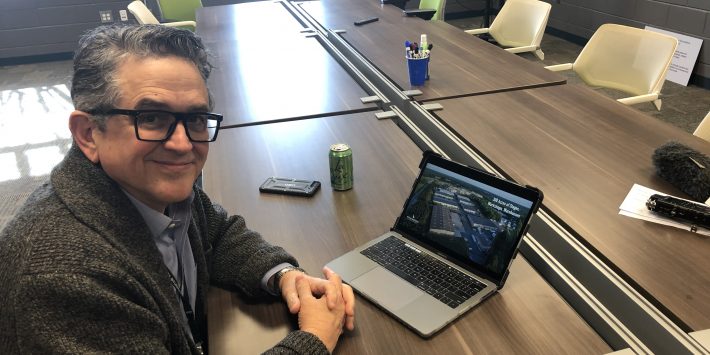The president of Pinewood Atlanta Studios – one of the largest studio complex outside of Hollywood – told WABE’s “Morning Edition” it’s time to get back to work and resume production. The studio is based in Fayetteville and sits on 700 acres.
But president and CEO Frank Patterson said he first has to ensure the entire work environment is safe for everyone. He guessed that Pinewood would be back in production by this fall.
“We have put together a task force and are working with the studios, guilds, unions and associations to try to share what we can do on our part,” Patterson said.
Patterson noted that before the pandemic, there was a historic demand for content to feed an endless pipeline of subscribers on streaming platforms.
“Netflix posted significant gains and subscribers this last quarter, Disney+ is growing through the roof, and these subscription services are what’s entertaining us right now, while we’re all locked in,” Patterson said.
“Subscribers want to see new shows, and those new shows have been stopped for a couple of months. It’s hard to put a dollar figure on what that means.”
That comes as Gov. Brian Kemp recently issued guidelines for production that features safer filming scenarios in an industry shaken by the coronavirus pandemic. The preventative practices were approved by the Centers for Disease Control and Prevention and the Georgia Department of Public Health.
When it comes to casting, health officials recommend eliminating “open calls” and asking actors to wait in vehicles until their scheduled time.
During a day of shooting, camera angles, lenses and shot set-ups should be adjusted to allow for greater distance between actors.
If a scene makes it impossible for actors to stay 6 feet apart, staff are asked to keep a record of interactions between actors so the spread of the coronavirus could be traced back. Extras and background actors may be severely reduced. It’s also recommended that costume fittings take place off-set or remotely with personal protective equipment.
But the Georgia Department of Economic Development wrote those guidelines are “non-binding” – and that “guilds, unions, production companies and studios may also have their own regulations.” The department told WABE it hadn’t heard of any full production shutdowns as of May 26.
“We have been working closely with productions throughout the COVID-19 response and thank them for the many ways individuals and companies have helped the state despite difficult circumstances,” Lee Thomas, deputy commissioner for the Georgia Film, Music & Digital Entertainment Office, said in an emailed statement.
When asked if production studios were expected to bear the extra costs of PPE and extra transportation, Thomas said those film industry best practices are “suggestions based on CDC recommendations.”
Nearly 400 Georgia film and TV productions in 2019 brought-in more than $9.2 billion in wages for state workers, according to Gov. Kemp’s office. Officials say approximately 51,000 Georgians are employed in the film industry.
But the coronavirus pandemic has axed jobs and pay for thousands. In fiscal year 2019, the Atlanta Business Chronicle reports that 391 productions were filmed in Georgia. That includes feature and independent films, TV series and commercials.
“Honestly, I watch these shows on streaming platforms every day. It’s the way that I’m entertaining myself right now. We’ve just got to make certain we continue to feed product into that pipeline as soon as we can,” Patterson said.
He said that out of every tragedy, there are some silver linings – even if it means, for a while, it will take more time and cost studios more money to deliver the final product.
“I think we’re going to learn how to work in a smarter and healthier way for one another,” he said.
“But the goal is to make certain that the quality of the product remains high. These are great storytellers. We’ve got to make sure that the consumer doesn’t see any difference at the end of the day.”









